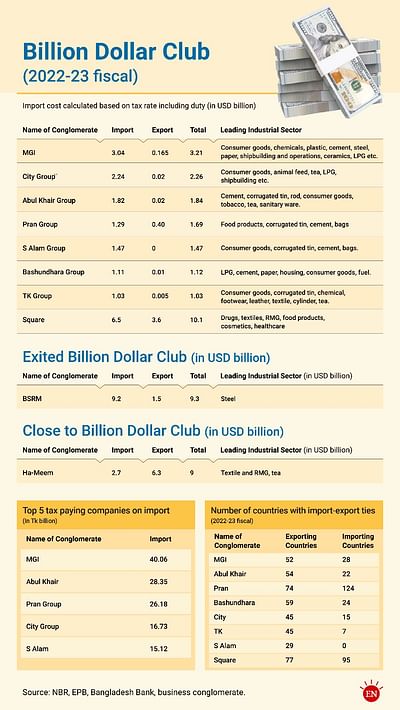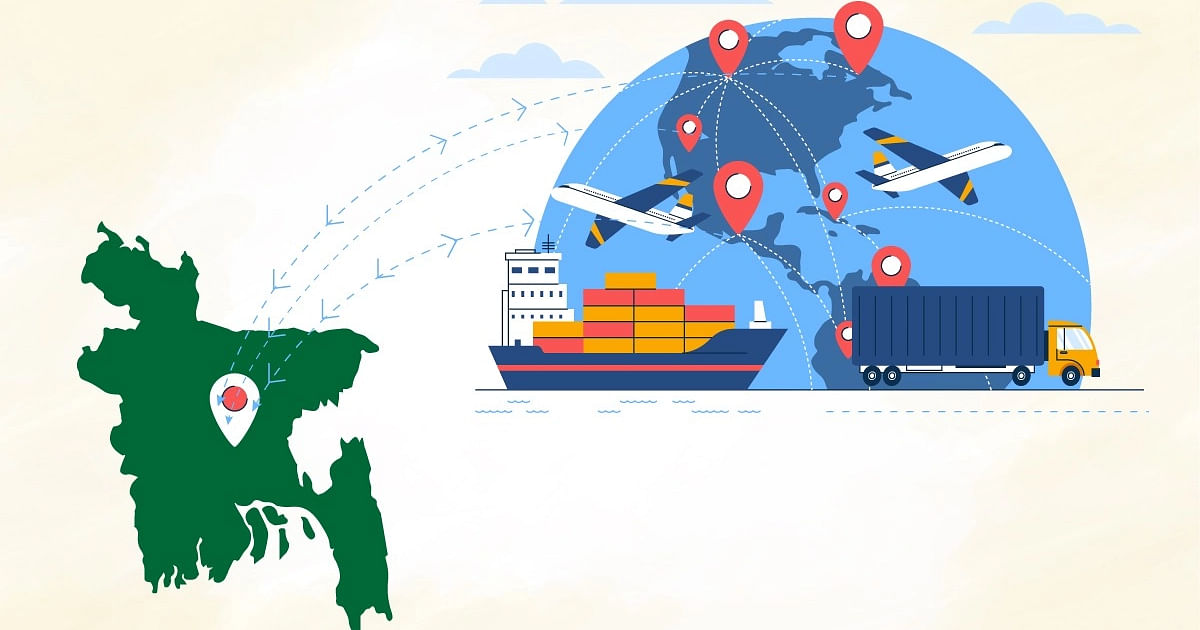Black_cats
ELITE MEMBER

- Joined
- Dec 31, 2010
- Messages
- 10,031
- Reaction score
- -5
8 local business conglomerates enter billion-dollar club
Imports have been hampered due to the economic crisis. Industrial production has fallen at the same time. Even in this crisis, the volume of export and import-related transactions of eight business conglomerates of the country has surpassed USD 1 billion.Masud Milad
Updated: 18 Sep 2023, 08: 46

The country is passing through all sorts of economic crises at present. Businesspersons are struggling to import commodities due to the dollar crisis. But despite this crisis period, eight business conglomerates of the country have entered the billion-dollar club.
These eight industrial groups are Meghna Group of Industries (MGI), City Group, Abul Khair Group, S Alam Group, TK Group of Industries, Pran, and Square Group of Industries. Some of these groups are leading the import substitution industrialisation and some are leading the export sector.
The BSRM group dropped out of the list due to the decline in the import of raw materials. The business group imported products of USD 920 million in the 2022-23 fiscal, which was USD 1.37 billion the previous year.
The Ha-meem Group, one of the top exporters in the garment sector, is near reaching the billion-dollar mark due to the increase of exports. Its export and import related transactions rose to USD 900 million.
Meanwhile, the Akij Group could not make it to the billion-dollar club as the company was divided among the successors. Entrepreneurs say the number of business conglomerates in the billion-dollar club could be higher if there was no economic crisis.
According to the figures of the Bangladesh Bank and the Export Promotion Bureau, the volume of exports and imports in the last fiscal was USD 130.62 billion. Of it, the amount of export and import of these eight business conglomerates was USD 13.54 billion in total.
The billion-dollar club
Prothom Alo has prepared this list analysing the export related data of the mother companies of these business conglomerates. Joint investments of the top groups and the financial accords of the companies outside the main group were not taken into account in this list.Besides, overseas companies were also excluded from the list. All the industrial groups in the billion-dollar club manufacture food products. The Meghna Group of Industries and the City Group have the raw material producing factories for consumer’s products. The number of import substitution factories is higher among all these conglomerates, except Pran and the Square Group of Industries. However, these companies are stressing on exports now.
Meghna Group tops the business conglomerates
Meghna Group of Industries has grown into the top company by setting up factories in new sectors and expansion of investments. The business group is now operating in 20 different sectors.The journey of MGI began from the banks of the Meghna river. However, as there is no more room for investment there, the company is moving to the Cumilla economic zone with a plan to invest in large factories. The business conglomerate has invested in three large factories of rods, paper and glass.
The group imported 7.7 million tonnes of raw materials and equipment worth USD 2.64 billion in the last fiscal. The government earned revenue of Tk 46 billion from these imports. The group also exported products and services worth USD 165 million in that period. Apart from that, the newly founded Meghna PVC Factory is also in operation now and has started exporting products. Besides, the group also exports food products, chemicals, edible oil, animal feed, cement and bags. In total the volume of the company’s transaction was USD 3.21 billion in the last fiscal.
Entrepreneur Mostafa Kamal founded the Meghna Group of Industries some 46 years ago. The company has six brands of products in the market. It has almost 50,000 employees across the country.
Asked how the company maintained growth despite the ongoing economic crisis, MGI group chairman Mostafa Kamal told Prothom Alo, “There is no way to pause during the period of crisis. This is why we continued with our investments. We are going to invest USD 1 billion in the economic zone of Cumilla soon.
Apart from meeting the demands within the country, we are now prioritising export now as well. We are also realising export incomes from carrying products through the sea. Exports of different products, including chemicals and plastic products will further rise if the government takes initiatives to increase policy assistance.
City Group invest in essentials to diversified products
City Group leads in marketing essentials, but they are bringing diversification by investing in papers, liquefied petroleum gas (LPG) and cement sectors. They are increasingly investing in tea gardens and operating cashew nut factories.City Group imported about 2.85 million tonnes of goods spending USD 2.07 billion in the last fiscal and paid Tk 16.73 billion in revenue to the state exchequer, as well as exported 26,000 tonnes of goods and brought USD 19.4 billion home. The Group exports food products, tea, edible oil, etc. Its import-export turnover was USD 2.26 billion or Tk 224.38 billion in the 2022-23 fiscal.
Industrialist Fazlur Rahman founded City Group in 1972. This conglomerate has added many new businesses over the past two decades and Teer is its flagship brand.
Abul Khair leads in heavy industry
Abul Khair Group is leading in heavy industry including cement, rod and corrugated iron sheets. The Group’s Shah Cement Industries Limited leads the market. Abul Khair is also the market leader in corrugated iron sheets and comes in second place in producing iron rods and marketing tea. They also lead the market in powdered milk and are doing good business on sanitary products, tobacco and essentials.Abul Khair Group imported 9 million tonnes of goods spending USD 1.82 billion in the last fiscal and paid Tk 28.35 billion in revenue to the government, as well as exported 9,000 tonnes of goods worth USD 16.5 million. The Group exports food products, tobacco, cement, bags and tea.
Industrialist Abul Khair is the founder of the Abul Khair Group. He started from a modest grocery shop in 1950 and his successors have taken the business to even greater heights after his death. Other than the import revenue, the group also pays the government significant revenue.
PRAN exports to 145 countries
PRAN Group first exported canned pineapple to France in 1997. Since then they have so far exported goods to as many as 145 countries including Western Samoa, Cape Verde, Vanuatu, Burkina Faso and Solomon Islands.PRAN Group exported goods to 125 countries in the 2022-23 fiscal and earned about USD 4 billion or Tk 39.27 billion. They imported goods and machinery of USD 1.03 billion or Tk 102.24 billion for raw materials and factory expansion and paid Tk 26.18 billion in revenue to the state exchequer. Its import-export turnover was USD 1.69 billion or Tk 167.69 billion in the 2022-23 fiscal.
PRAN-RFL Group Chairman and CEO Ahsan Khan Chowdhury told Prothom Alo, “Our dream is to market the products of Bangladesh and we have just started the journey. We want to do better in the 145 exporting markets of PRAN. We are trying so that we can lead in different sectors other than the garments and those include toys, plastic, furniture, electronics and shoes. Since we have skilled mid-level officials, as well as skilled and hardworking labourers, it is possible to fulfil this dream.”
S Alam is in the billion-dollar club with oil, sugar and wheat
A dollar crisis coupled with a fear of a possible fall in global prices contributed to a drop in imports in the last fiscal. Amid such circumstances, S Alam increased the import of essentials and entered the billion-dollar club for the first time. This conglomerate spent USD 1.23 billion to import oil, sugar and wheat, which was 94 per cent of its total import. S Alam spent USD 1.47 billion or Tk 146.38 billion on imports including the revenue that they paid to the government. No data was available on its export.Bashundhara ventures to new sectors
Bashundhara Group had been in the business of processing essentials a decade ago, but the conglomerate is now experiencing sees downtrend in this sector. So, they expanded business in new sectors including chemicals, processing of energy products, steels and gold refining process. Their main imported products are raw materials and machinery that are required when making a new investment.Bashundhara Group also exports food products, papers, tissue and chemicals to 24 countries and its import-export turnover was USD 1.12 billion or Tk 111.38 billion in the 2022-23 fiscal.
TK Group in billion dollar club for the first time
Founded by two brothers Mohammed Abu Tayab and Mohammad Abul Kalam, TK Group of Industries opened many factories for the first in Bangladesh. Their businesses have expanded from manufacturing LPG cylinders to acrylic fibre. TK Group entered the billion-dollar club for the first time in its 50 years of operation.TK Group imported goods of USD 96 million or Tk 95.10 billion, as well as exported goods of USD 450 million. They exported goods including food products, fibers and chemicals. Its turnover was USD 1.03 billion or Tk 102.47 billion in import, export and revenue in the 2022-23 fiscal.
TK Group of Industries director Mohammad Mustafa Haider told Prothom Alo that policy support is necessary in the existing situations to encourage the exporting sectors and policy that attracts foreign investment will have to be adopted. There will be ups and downs in the economy all the time. However, at present, it is necessary to take steps that will resolve the dollar crisis and other problems, he added.
Square near milestone of exporting to 100 countries
Square's exports are expanding gradually. Square products are being exported to six continents. These have been exported to 95 different countries. The group will reach the milestone of 100 countries if commodities are exported to five more countries. Square exported commodities worth USD 362.4 million in the last year. The items include garments, textiles and foods.Alongside export, the commodities of Square are being marketed within the country too. The group imported raw materials and machineries worth Tk 55.80 billion in the last year. The group had a transaction including export and import worth USD 1.01 billion last year.
Square started its business with pharmaceutical drugs 65 years ago. Its business has expanded in new sectors. The group has entered the billion-dollar club in export and import this time. Although the business started with four friends in 1958, Samson H Chowdhury mainly steered Square. After his death, his sons are running the Square and taking it forward.
Solution to the dollar crunch sought
The billion-dollar businesspersons find the dollar crunch as the most critical challenge right now. The business conglomerates have been facing problems in importing products due to this dollar crisis. At the same time, they have been finding it hard to pay instalments for the factories opened with foreign investment. They have deferred implementation of many new projects due to the ongoing crises.The businesspersons demanded policy support for their export-oriented industries and also policies to attract foreign investment to resolve the issues.
They further said though the prime minister issues many directives to ease doing business, those have very little fruition on ground.
If the environment of doing business is made easier, it would help increase investment and creation of new entrepreneurs, they hoped.

8 local business conglomerates enter billion-dollar club
Imports have been hampered due to the economic crisis. Industrial production has fallen at the same time. Even in this crisis, the volume of export and import-related transactions of eight business conglomerates of the country has surpassed USD 1 billion.



